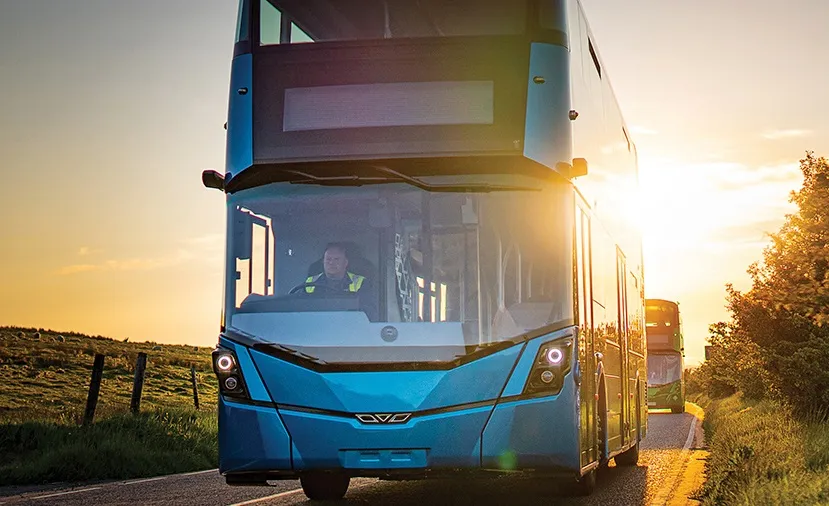Following the UK vote to leave the European Union, with votes of 52 per cent for Leave and 48 per cent for Remain, Patrick Flaherty, chief executive – UK & Ireland, AECOM, said the country faces a period of change and uncertainty and business must play a stabilising role. “A positive, long-term focus on the future is required despite a referendum result that we and many businesses did not want,” he commented.
The Freight Transport Association (FTA) says coming out of union risks new costs, restrictions a
June 24, 2016
Read time: 3 mins
Following the UK vote to leave the European Union, with votes of 52 per cent for Leave and 48 per cent for Remain, Patrick Flaherty, chief executive – UK & Ireland, AECOM, said the country faces a period of change and uncertainty and business must play a stabilising role. “A positive, long-term focus on the future is required despite a referendum result that we and many businesses did not want,” he commented.
The6983 Freight Transport Association (FTA) says coming out of union risks new costs, restrictions and bureaucratic requirements being imposed on moving goods in and out of Europe and is calling on the Government to prioritise arrangements for international freight transport in its negotiations, minimising additional legislation and keeping costs as low as possible for British businesses.
Flaherty pointed out that no nation has ever left the EU, so the long-term impact cannot be accurately forecast at this time. These are unchartered waters made even more uncertain by the Prime Minister’s announced resignation and the leadership election that will follow. Business must support government as it leads the country through this period of change.
“Business inevitably now faces a period of disruption. At AECOM, we have demonstrated our ability to grow while dealing with change and we will work hard to minimise the impact on our UK operations. As a global company, we serve clients all over the world from our offices in the UK. Our strong team, diversification strategy and international outlook equip us with long-term resilience but we are well aware that many businesses are not so fortunate.
“It is critical that the domestic agenda is not sidelined as the UK faces a minimum of two years of negotiations to leave the EU. Focus must remain on energy security and energy independence, as well as progressing the UK’s ambitious infrastructure pipeline. Schemes such as HS2, Crossrail 2 and the Northern Powerhouse programme are vital to the country’s ability to compete on a global stage, which is more crucial than ever due to this referendum result.”
FTA chief executive David Wells said: “Even though we are coming out of Europe politically, it remains our biggest export market and the supplier of a high proportion of our imports. We cannot allow new bureaucratic burdens to hamper the efficient movement of exports heading for customers and imported goods destined for British consumers."
"Britain may be out of Europe but it's not out of business and FTA will be leading the campaign on behalf of exporters and importers to keep trade procedures simple and the costs of international transport down.”
The
Flaherty pointed out that no nation has ever left the EU, so the long-term impact cannot be accurately forecast at this time. These are unchartered waters made even more uncertain by the Prime Minister’s announced resignation and the leadership election that will follow. Business must support government as it leads the country through this period of change.
“Business inevitably now faces a period of disruption. At AECOM, we have demonstrated our ability to grow while dealing with change and we will work hard to minimise the impact on our UK operations. As a global company, we serve clients all over the world from our offices in the UK. Our strong team, diversification strategy and international outlook equip us with long-term resilience but we are well aware that many businesses are not so fortunate.
“It is critical that the domestic agenda is not sidelined as the UK faces a minimum of two years of negotiations to leave the EU. Focus must remain on energy security and energy independence, as well as progressing the UK’s ambitious infrastructure pipeline. Schemes such as HS2, Crossrail 2 and the Northern Powerhouse programme are vital to the country’s ability to compete on a global stage, which is more crucial than ever due to this referendum result.”
FTA chief executive David Wells said: “Even though we are coming out of Europe politically, it remains our biggest export market and the supplier of a high proportion of our imports. We cannot allow new bureaucratic burdens to hamper the efficient movement of exports heading for customers and imported goods destined for British consumers."
"Britain may be out of Europe but it's not out of business and FTA will be leading the campaign on behalf of exporters and importers to keep trade procedures simple and the costs of international transport down.”









